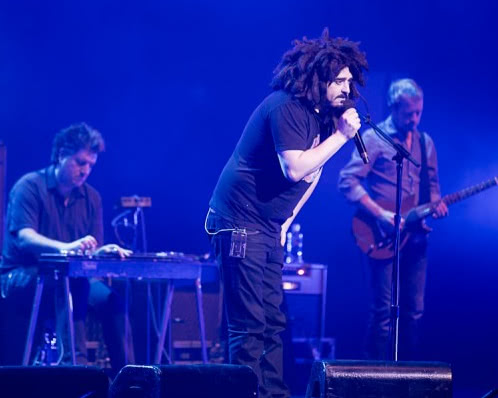Counting Crows have managed to trundle along comfortably doing what they do since their inception and rise to the fame in the early 90s.
Much like American contemporaries R.E.M. or Dave Matthews Band, they’ve inadvertently struck mainstream popularity at several intersections in their career, while maintaining a loyal following.
There’s been little variation to their character across the space of six albums in two decades, evolving marginally since their breakout debut, 1993’s August & Everything After, but that’s precisely why their leagues of fans love them.
As soon as the seven-piece amble on stage, they’re greeted with some fevered appreciation before they begin a lilting piano introduction to August… cut, ‘Sullivan Street’.
The full weight of the band’s tri-guitar sway then takes hold. Courtesy of co-founder David Bryson, David ‘Immy’ Immerglück, and the cream Telecaster of the fedora-capped Dan Vickery.
The trio bolstered by the deft piano work of multi-instrumentalist Charlie Gillingham and the rhythm section of drummer Jim Bogios and bassist Millard Powers.
Front and centre, both musically and physically, lending his distinctive voice to honeyed tales of heartache, is ringleader Adam Duritz – not least because of his thick mane of dreadlocks. (He once sang “I wanna be a lion” on ‘Mr. Jones’, now he very much resembles one.)
As Duritz states in the prologue to the bluesy ‘Mercury’, “this is not a song about love, it’s a song about addiction.”
In that case, all of the frontman’s songs are about addiction, or at least stuck on his complications with dealing with the opposite sex.
His physical gestures that accompany the lyrics lend a sense of theatre to proceedings, such as ‘High Life’ in which he fills his pockets with his hands and shrugs like a child to the opening line, “such a life…”
The drama is occasionally too literal (and slightly grating), but he’s clearly a performer that makes the most of his singing, and still charged with a youthful energy, in an eccentric way.
Especially in comparison to his bandmates, who could be easily confused for roadies outside of sharing a stage with the singer, if not for their technical skill on stage of course.
The vocal harmonies that punctuate the show are pitch-perfect, while the consistent instrument swapping of the ensemble proves their skill and synergy.
They can let loose too. Slugs of guitar bring their cover of Coby Brown’s ‘Hospital’ a hefty punch, while columns of light pulse through dense smoke, briefly transforming the hall into a rock arena.
Seven songs in, non-album favourite ‘Colorblind’ brings a response that is nothing if not ecstatic; the audience is either less familiar with the various covers from Underwater Sunshine, the band’s latest album, or are simply starved for something they can sing along to.
With a stark spotlight on Millard Powers, the bassist shifting to piano to perform the song’s mournful arpeggios, Duritz cradles the mic up front.
An expressive rendition of ‘Anna Begins’ follows, carrying all the cathartic power of the original, but the frontman seems to be elusive in indulging fans’ desires to sing-along.
His elastic phrasing and loose, playful melodies mean that voices can be heard singing between the gaps, he similarly toys with ‘Miami’ – though with its simmering march and breathtaking baroque break, it’s less noticeable.
Another curio is that the singer works in lyrical references to other songs into the band’s originals.
A beautifully extended ‘Goodnight Elisabeth’ takes in a build-and-release climax of the Velvet Underground’s ‘Pale Blue Eyes’ (“Linger ooooon”).
Later, a reworked and rousing version of ‘Rain King’ loosely works in Elbow’s ‘Lippy Kids’, with Duritz belting out the refrain of “build a rocket boys” in a way that’d make Guy Garvey proud.
The sly additions and mercurial approach to their arrangements are appreciated, but some of the audience is showing less respect.
There’s lots of coming going of those possibly dealing with the aftermath of their Easter Sunday feasts (or too much chocolate) – either way, there’s an unusually high rate of foot traffic to distract throughout the concert.
The New Wave dappled ‘New Frontier’ adds an upbeat shift in tone and mood, regaining some attention, while another August… cut, ‘Time And Time Again’ receives ballooning applause before Counting Crows settle into its blue-eyed soul swagger, with deft organ work and lap steel guitar.
Duritz then disembarks from the set, moving to piano to play a solo rendition of ‘Goodnight LA’.
Voicing his concerns about not remembering, “how it goes” he comically yet gracefully spills into a vulnerable, human performance. He needn’t have worried (musos, ey?).
Next, ‘A Long December’ is stretched into a grand version, where each section is given space to spread its wings, while Charlie Gillingham stretches his legs – strolling across the stage playing the accordion and leaning on the speaker stacks like a true French lothario.
The band’s three-song encore takes in ‘Washington Square’ (“a song about home”), the Southern Fried ‘Hanginaround’, its loping groove getting people up and moving, and finally, ‘Holiday In Spain.’
An anthem to escapism and short-but-sweet trysts, both geographically and romantically – that’s Counting Crows in a nutshell.
Their days of innovation may well be behind them, but few bands are as reliable when it comes to rich, classic American-styled songwriting, and a dependable performance to spin those yarns.

































